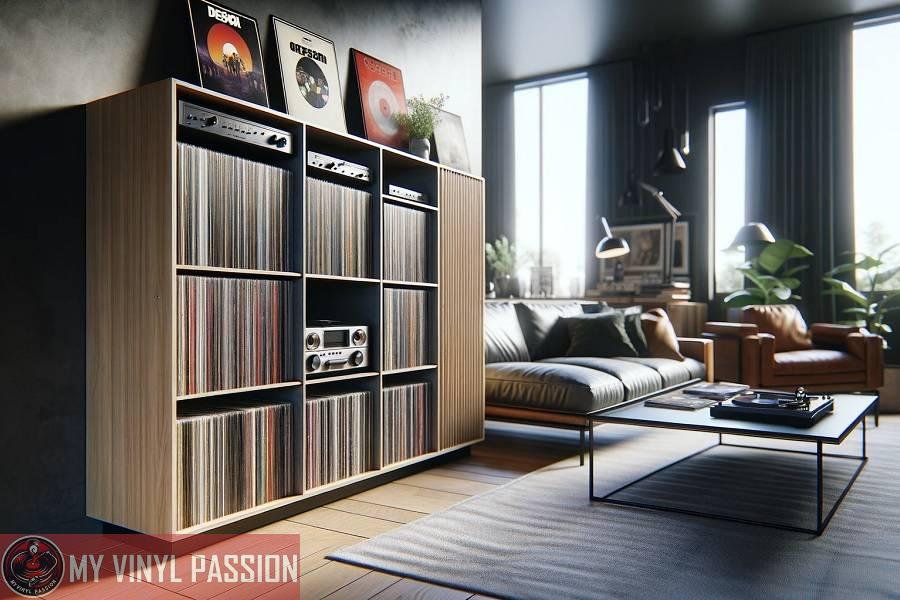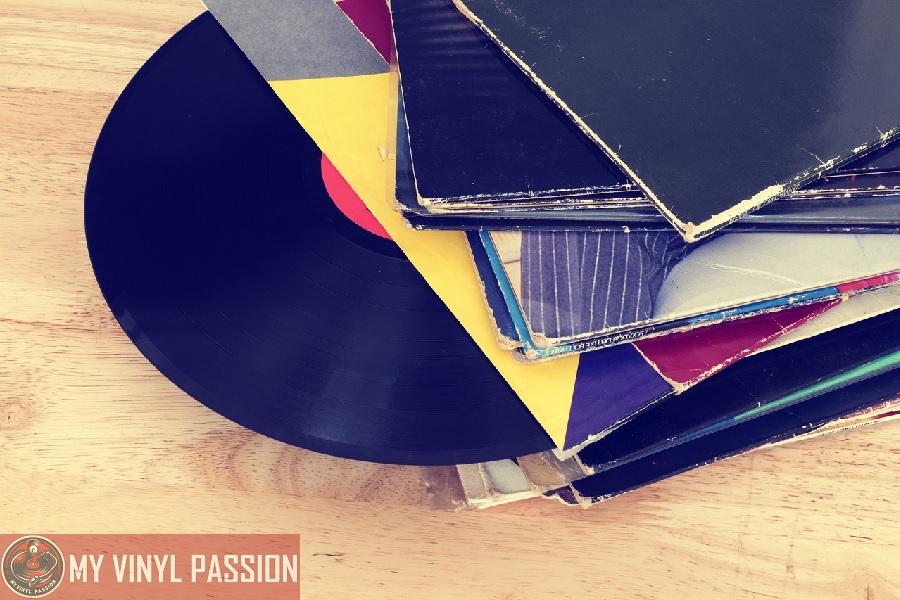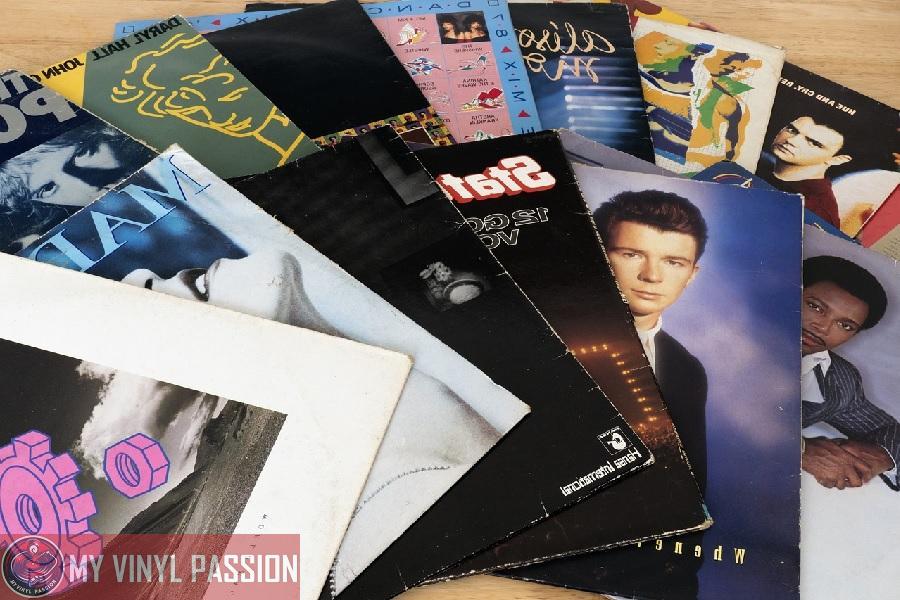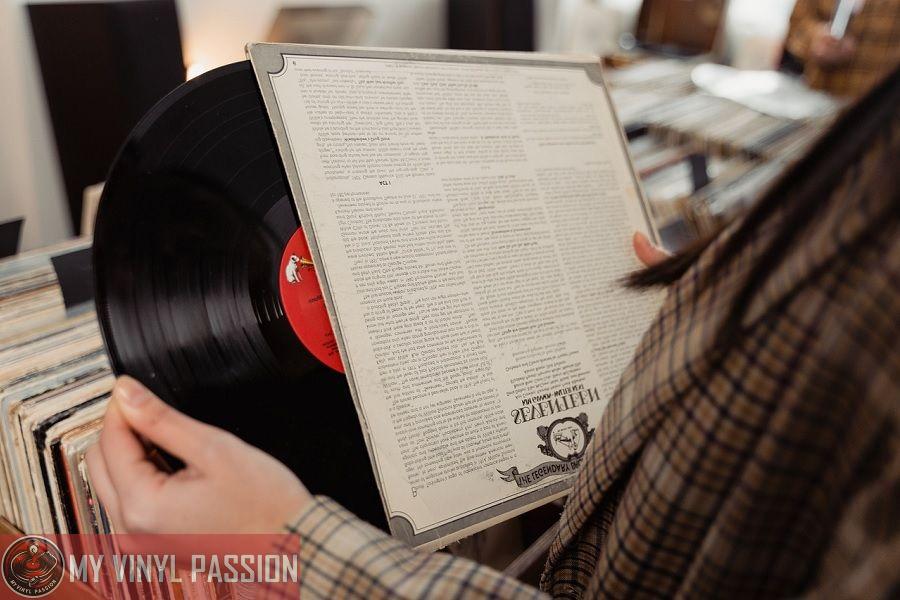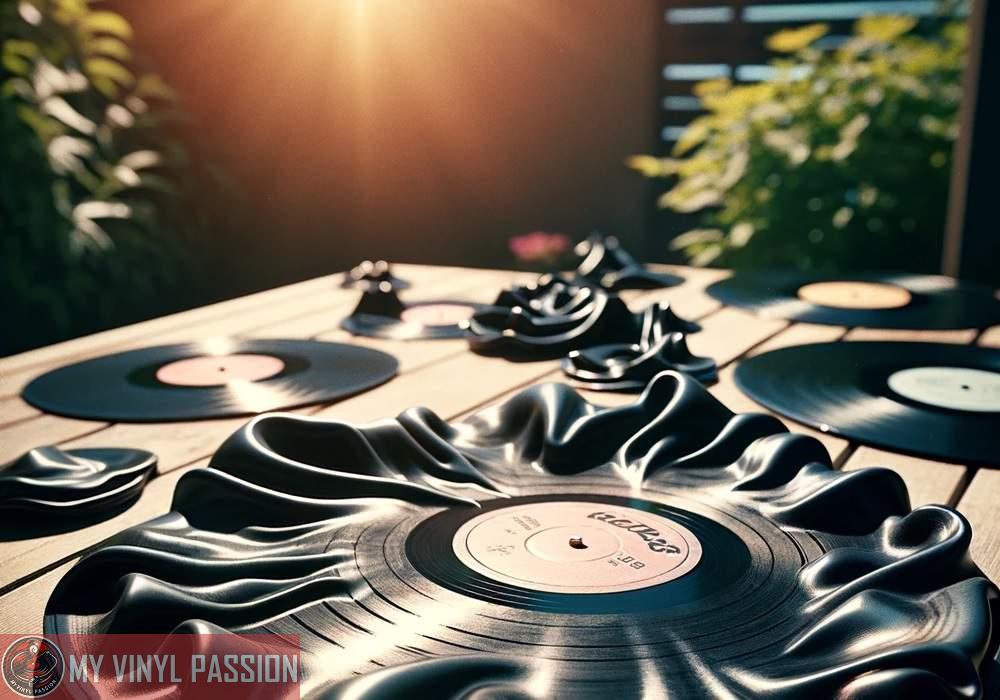Storing your vinyl records properly is crucial to ensure they last for years and maintain the best possible sound quality.
Vinyl collections are prized not only for their audio fidelity but also for their cultural and aesthetic appeal. When you’re looking after vinyl albums, it’s important to consider factors such as temperature, humidity, and the way the records are stacked or stored.
In Summary
Vertical Storage: Store vinyl records vertically and upright, like books on a shelf, to prevent warping and unnecessary pressure on the records.
Avoid Direct Sunlight and Heat: Keep the records in a cool, dry place away from direct sunlight and heat sources to prevent warping and deterioration.
Use Protective Sleeves: Place records in protective sleeves and, if possible, additional outer plastic sleeves to guard against dust, scratches, and environmental damage.
Maintain a Stable Environment: Ensure a stable, humidity-controlled environment, ideally between 35-40% relative humidity, to preserve the vinyl’s quality and prevent mold growth.
To prevent warping and scratches, vinyl records should be stored vertically and never stacked on top of each other.
Additionally, the environment where you store your collection should be consistent in temperature and relatively cool, avoiding any places that are susceptible to heat like attics or cars.
Humidity also plays a role in preserving your records, as too much moisture can lead to mold and mildew, while too little can cause the vinyl to become brittle.
Using the correct inner and outer sleeves is equally significant. Make sure to replace any paper sleeves with high-quality, anti-static inner sleeves. The outer sleeve should be made of plastic and provide a firm fit without being too tight.
This helps to keep dust, dirt, and other potential contaminants away from the grooved surface. These practices, grounded in a knowledge of materials science and a respect for vinyl as a medium, will ensure that your albums remain a source of enjoyment and value.
Understanding the Basics of Vinyl Storage
When storing your vinyl record albums, it’s important to manage environmental factors meticulously to ensure the longevity and quality of your collection.
Assessing the Environment
You must evaluate the condition and environment of the chosen storage area. Keep room temperature between 65 – 70°F (18 – 21°C) as extreme temperatures can warp vinyl.
The humidity should be moderate, ideally between 45-50% RH (relative humidity), to prevent mold growth and record deterioration. Avoid areas where temperature and humidity fluctuate, as consistent conditions are paramount for preserving vinyl integrity.
Choosing the Right Location
Opt for a location away from direct sunlight and ultraviolet light, which can cause irreparable damage to the album covers and vinyl records themselves.
Climate-controlled storage units are ideal, but you can also utilize interior spaces like closets within your living areas that meet the appropriate conditions.
Avoid storing vinyl in attics, basements, sheds, or garages, as these places often experience environmental extremes and can be detrimental to your collection’s health.
Preparing Your Vinyl Records for Storage
Before storing your vinyl records, it’s essential to ensure they are clean and protected. Proper cleaning removes dust and grime, while the right sleeving guards against environmental factors that could damage your records.
Cleaning Your Records
- Dust removal: Begin by gently wiping the surface of your vinyl record with a microfiber cloth to remove any loose dust. Always wipe in a circular motion along the grooves.
Deep cleaning: Use a record cleaning brush to dislodge more stubborn particles. For a thorough clean, apply a few drops of a dedicated vinyl cleaning solution and spread it evenly with the brush or cloth.
- Note: Always follow the instructions on the vinyl cleaning solution and avoid getting the label wet.
- Drying: After cleaning, leave your record out to air dry completely on a clean, soft surface to prevent any water damage.
Proper Sleeving
- Inner sleeves: Replace paper sleeves with new, high-quality inner sleeves. They should be anti-static and free of any abrasive materials that could scratch your records.
Outer sleeves: After placing the record in its inner sleeve, insert both into a protective outer sleeve. The outer sleeve should be clear and made of polyethylene to provide a barrier against dust, moisture, and scuffs.
- Tip: Make sure the opening of the outer sleeve is not facing upwards when shelved to prevent dust from settling inside.
By following these steps, your vinyl records will be clean and well-protected for storage, ensuring their longevity and maintaining sound quality.
Organizing and Storing Your Collection
Properly organizing and storing your vinyl record albums not only preserves their quality but also makes them easily accessible for your listening pleasure.
Employing the right storage units and accessories can significantly enhance the lifespan of your collection.
Maximizing Shelf Life
To maximize the shelf life of your vinyl records, invest in shelving that supports the records in an upright position. Ensure that your shelves or record cabinet are made of a sturdy material and are placed in a dry area away from direct sunlight.
The weight of the records should be evenly distributed to prevent warping. Consider adding turntable stands next to your shelving for convenience when playing your albums.
- Do:
- Use a shelf or cabinet designed to support the weight of vinyl records.
- Keep them away from heat sources and direct sunlight.
- Don’t:
- Overload shelves to the point of sagging.
- Stack records on top of each other horizontally.
Utilizing Dividers and Organizers
Dividers and organizers help maintain an orderly system, making it easy to find any album in your collection.
Use record dividers within your storage unit to categorize your albums alphabetically, by genre, or by any other system that suits your preferences. Also, vinyl record storage accessories such as sleeves and outer cases protect your records from dust and scratches.
Choose a storage option that facilitates easy flipping through your collection without having to remove each record from the shelf.
- Do:
- Label dividers clearly for quick selection.
- Keep your most played albums in an accessible spot on your organizer.
- Don’t:
- Cram records so tightly that you risk damage when removing them.
- Neglect the usefulness of dividers for large collections.
Protecting Vinyl from External Factors
When storing your vinyl record albums, it’s crucial to consider the environmental conditions such as heat, light, and physical stress that can lead to deterioration. Proper handling and storage can maintain the quality and longevity of your vinyl.
Avoiding Pressure and Weight
To prevent warping and potential scratches, store your vinyl records vertically and ensure they aren’t leaning, which could cause undue pressure over time.
Avoid stacking records on top of each other under any circumstance, as the weight can cause irreversible damage. Think of each record as a single entity that needs its own space, like books on a shelf.
Shielding from Light and Heat
Exposure to light and heat can severely affect the quality of your vinyl records. Keep them away from direct sunlight, which can lead to fading and warping.
Store your albums in a cool, consistent environment where the temperature doesn’t reach extreme levels. High heat sources such as radiators or vents should be avoided to prevent the vinyl from becoming brittle. Aim for a stable, moderated climate to preserve your collection.
Maintenance and Long-Term Care
Ensuring the longevity of your vinyl record collection involves meticulous maintenance and storage strategies. It’s essential for you to minimize exposure to deleterious elements and to handle your records correctly, ensuring that they sound pristine for decades to come.
Regular Cleaning and Handling
When you handle your vinyl records, always hold them by the edges or label to prevent oils from your fingers getting onto the grooves. Use an anti-static brush before and after each play to eliminate dust, which can accumulate and affect the quality of playback.
A stylus that is not properly cared for can introduce scratches or degrade the audio; therefore, clean your turntable needle regularly with a gentle brush or special cleaning solution.
- Before playback: Gently sweep with an anti-static brush.
- After playback: Use a clean, dry cloth to remove any accumulated dust.
Monitoring Storage Conditions
Maintain a controlled environment for your records; fluctuations in temperature and humidity are detrimental to long-term storage. Keep the ambient temperature between 65–70°F (18-21°C) and relative humidity at 45-50%.
Always store vinyl records vertically in sturdy sleeves to avoid warping, and keep them away from direct sunlight, which can cause vinyl to deteriorate.
- Vinyl Storage: Align records vertically and ensure they are not leaning to prevent warping.
- Environmental Factors: Use a hygrometer to monitor room conditions assiduously.
Emulate the Library of Congress when it comes to archival practices. Collectors who aspire to properly store their audio treasures must treat their collection as a library that requires a dedicated, stable environment.
FAQs
What is the best way to store vinyl record albums to prevent damage?
Store vinyl records vertically and upright, like books, in a cool, dry place away from direct sunlight, heat, and humidity to prevent warping and deterioration.
Can vinyl records be stored flat or stacked on top of each other?
It’s not recommended to store vinyl records flat or stacked, as this can cause warping and undue pressure on the records, potentially damaging them.
What kind of sleeves should I use for storing vinyl records?
Use inner protective sleeves made of polyethylene or similar materials for the records themselves, and consider outer plastic sleeves for additional protection of the album covers.
How important is temperature and humidity control in storing vinyl records?
Maintaining a stable environment, ideally at a temperature of 65-70°F (18-21°C) and 35-40% relative humidity, is crucial to prevent warping, mold growth, and other damage to vinyl records.
Is it necessary to clean vinyl records before storing them?
Yes, it’s advisable to clean vinyl records before storing them to remove dust and oils, which can cause long-term damage and affect playback quality.
